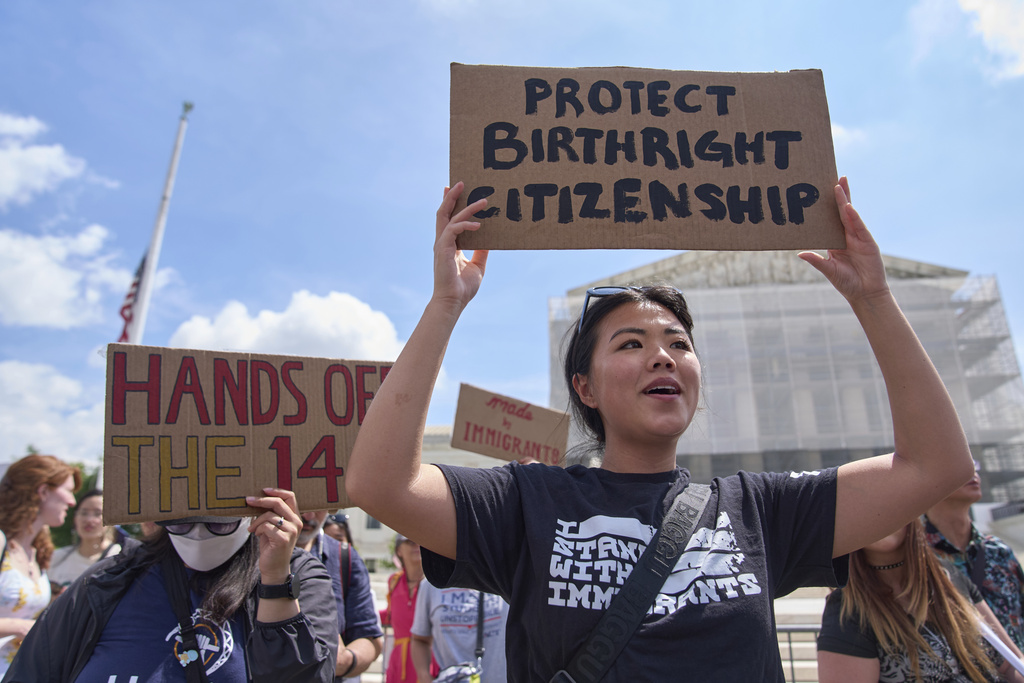
Hannah Liu, 26, of Washington, holds up a sign in support of birthright citizenship, Thursday, May 15, 2025, outside of the Supreme Court in Washington. "This is enshrined in the Constitution. My parents are Chinese immigrants," says Liu. "They came here on temporary visas so I derive my citizenship through birthright." (AP Photo/Jacquelyn Martin)
Updated at 12:33 p.m. on Friday, June 27, 2025.
The right to birthright citizenship remains intact in Colorado, despite a recent Supreme Court ruling that could enable President Donald Trump to temporarily halt the practice in other states. Colorado Attorney General Phil Weiser assured residents that the state would continue to uphold this right, even as the legal landscape shifts nationwide.
“You’re protected. And if people are born here in Colorado, they still will benefit from birthright citizenship,” Weiser stated during an interview with Colorado Matters. His comments come in the wake of a 6-3 Supreme Court decision, delivered by Justice Amy Coney Barrett, which potentially allows for the cessation of birthright citizenship in many parts of the U.S. for children born after February 19.
Supreme Court’s Decision and Its Implications
The Supreme Court’s ruling did not directly address the constitutionality of President Trump’s order to end birthright citizenship. Historically, this practice has granted citizenship to all children born on U.S. soil, irrespective of their parents’ immigration status. The court’s decision focused instead on the scope of judicial authority, ruling that lower courts had overstepped by issuing nationwide injunctions against Trump’s order.
As a result, the order may now be implemented in numerous states, though it remains blocked in Colorado and 21 other states that have challenged the order. The majority opinion emphasized the need to curtail judicial overreach, stating, “When a court concludes that the Executive Branch has acted unlawfully, the answer is not for the court to exceed its power.”
“This was a big decision, an amazing decision, one that we’re very happy about this morning,” President Trump remarked during a press conference. “The Supreme Court has delivered a monumental victory for the Constitution, the separation of powers, and the rule of law.”
Potential Chaos and Legal Uncertainty
The Supreme Court has stayed its decision for 30 days, allowing time for further legal challenges. Attorney General Weiser warned of potential chaos if Trump’s order is enacted, creating a scenario where children born to undocumented parents in Colorado would receive citizenship, but those in neighboring states might not.
“If someone’s born in Colorado but lives in Wyoming, are they a birthright citizen or not?” Weiser questioned, highlighting the confusion and legal uncertainty that could ensue. The ruling has broader implications, potentially affecting other legal battles and policies, including the defunding of sanctuary cities like Denver.
Justice Sonia Sotomayor, dissenting, described the ruling as a “grave attack on our system of law,” warning that it could set a precedent for future administrations to erode constitutional rights.
Political and Legal Reactions
The decision has elicited strong reactions from political figures and legal experts. Colorado Governor Jared Polis criticized the ruling, asserting that it undermines constitutional protections and creates a fragmented legal landscape across states. Meanwhile, Rep. Joe Neguse labeled the decision “misguided and reckless,” while Rep. Gabe Evans supported the ruling, focusing on limiting judicial overreach.
Legal scholars remain divided on the use of universal injunctions. Some argue they are necessary to protect individuals from sweeping governmental actions, while others believe they encourage forum shopping and undermine judicial integrity.
The Ongoing Battle for Birthright Citizenship
Attorney General Weiser has pledged to continue fighting Trump’s executive order, which challenges the longstanding interpretation of the 14th Amendment. Legal experts anticipate that the Supreme Court may eventually address the fundamental question of whether the President can unilaterally alter birthright citizenship.
The 14th Amendment, ratified in 1868, has historically guaranteed citizenship to all persons born or naturalized in the U.S. The principle of jus soli, or “right of the soil,” has been a cornerstone of American citizenship law since the 1898 ruling in United States v. Wong Kim Ark.
Critics of birthright citizenship argue that it incentivizes illegal immigration and “birth tourism.” President Trump has claimed that the 14th Amendment was never intended to apply universally, a view contested by many legal scholars and immigrant rights advocates.
“This isn’t actually about birthright citizenship,” said Jennifer Piper of the American Friends Service Committee. “This is about a president’s attempt to consolidate all authority with himself, and that should concern every single person in this country.”
The ongoing legal battle over birthright citizenship could have significant implications for hundreds of thousands of children born in the U.S. each year. As the fight continues, the outcome remains uncertain, with potential consequences for immigrant families and the broader interpretation of constitutional rights.






